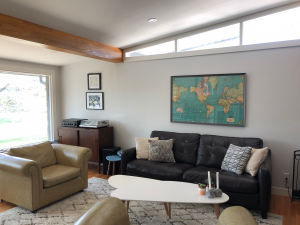 For quite some time, my husband and I have considered ourselves “minimalists”. We make weekly trips to second-hand depots where we pass on things we once thought we needed. We second- and third-guess our purchases, asking ourselves and each other “do we really need this?” before allowing it into our home. Most of our cupboards and drawers are half full, and in several rooms, we’ve had to take down shelves because we simply had nothing left with which to fill them. “Is this room too bare?” I asked my mom after another recent purge. “It’s… sparse,” was her reply. Perfect, that’s just the way we like it.
For quite some time, my husband and I have considered ourselves “minimalists”. We make weekly trips to second-hand depots where we pass on things we once thought we needed. We second- and third-guess our purchases, asking ourselves and each other “do we really need this?” before allowing it into our home. Most of our cupboards and drawers are half full, and in several rooms, we’ve had to take down shelves because we simply had nothing left with which to fill them. “Is this room too bare?” I asked my mom after another recent purge. “It’s… sparse,” was her reply. Perfect, that’s just the way we like it.
But there’s a spiritual danger to minimalism that is often overlooked. Everyone seems to understand the problem of buying and keeping and owning too much: not only is it a detriment to our bank account to be constantly accumulating but also, as Pope Francis rightly cautions, “voracious consumerism kills the soul.” “The more I have, the more I want, the more I have, the more I want,” he continues, warning us against tethering our happiness to the amassing of stuff.
If consumerism is the vice, it’s tempting to assume that minimalism is the opposing virtue; if accumulating too much is the problem, getting rid of it all must be the solution. However, it’s not the consumption of goods itself that harms us but the trust in these goods to make us happy, more fulfilled. I’ll be happy when I have another bag/a better wardrobe/a newer car/a bigger house. Everything in my life will be perfect when I have this or that.
In many ways, minimalism can lead us down the same path that tempts us to connect our happiness to the material world around us. Those of us who have waded into the waters of minimalism can find ourselves just as attached to our perfectly curated possessions and perfectly streamlined surroundings as those whose houses are full of the things they thought would make them happy. I’ll be happy when I get rid of everything, when my house is cleaner, when my closets are organized. Everything in my life will be perfect when everything in my home is.
A better virtue to combat consumerism, then, is not minimalism, but simplicity. The simple soul, says St. Francis de Sales, “has but one sole end – that of gaining the love of God. Our soul is then truly simple when we have no aim at all but this, in all we do.” We combat materialism in our homes and in our hearts, not just by living minimally (though this may help), but also by living simply, that is, by securing our happiness, not to our things, or lack thereof, but to His unconditional love.
My husband and I will continue to live “minimally”. Our home will always be in a constant state of downsizing; our favourite date night will still be organizing the garage! But we’re much more careful now not to seek happiness in the perfectly purged home, or to seek perfection in our home at all. As Francis de Sales says, “there is a certain simplicity of heart which is the perfection of all perfections.” This simplicity, this focus on Love, is where true happiness – and perfection – lie.
